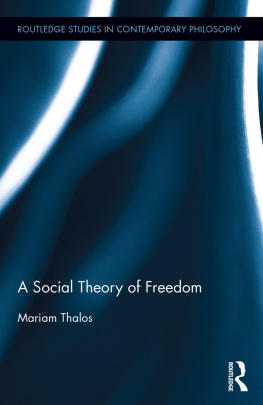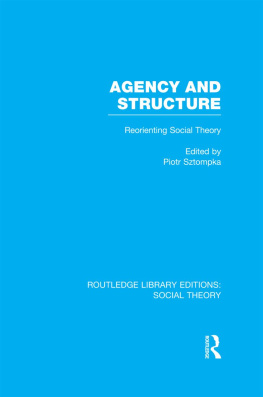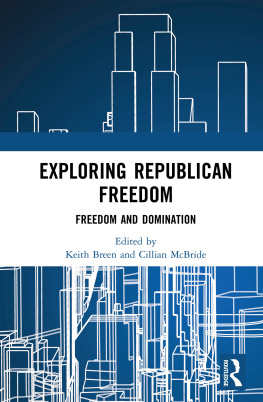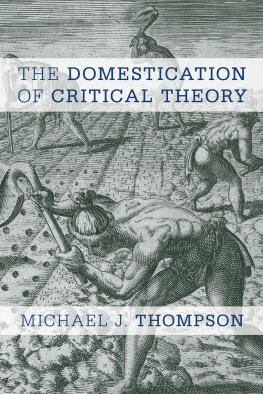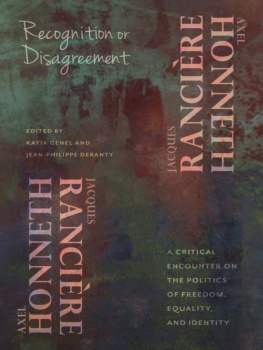A Social Theory of Freedom
In A Social Theory of Freedom, Mariam Thalos argues that the philosophical theory of human freedom should be a broadly social and political theory that employs tools of phenomenology, rather than a theory that locates itself in relation to canonical positions regarding the issue of determinism. Thalos rejects the premise that a theory of freedom is fundamentally a theory of the metaphysics of constraint and, instead, lays out a political conception of freedom that is closely aligned with questions of social identity, self-development in contexts of intimate relationships, and social solidarity. Thalos argues that whether a person is free (in any context) depends upon a certain relationship of fit between that agents conception of themselves (both present and future), on the one hand, and the facts of their circumstances, on the other. Since relationships of fit are broadly logical, freedom is a logicit is the logic of fit between ones aspirations and ones circumstances, what Thalos calls the logic of agency. The logic of agency, once fleshed out, becomes a broadly social and political theory that encompasses ones self-conceptions as well as how these self-conceptions are generated, together with how they fit with the circumstances of ones life. The theory of freedom proposed in this volume is fundamentally a social one.
Mariam Thalos is Professor of Philosophy at the University of Utah, USA.
Routledge Studies in Contemporary Philosophy
For a full list of titles in this series, please visit www.routledge.com
70Science and the Self
Animals, Evolution, and Ethics: Essays in Honour of Mary Midgley
Edited by Ian James Kidd and Liz McKinnell
71Resisting Biopolitics
Philosophical, Political, and Performative Strategies
Edited by S. E. Wilmer and Audron ukauskait
72Experiential Learning in Philosophy
Edited by Julinna Oxley and Ramona Ilea
73On the Genealogy of Color
A Case Study in Historicized Conceptual Analysis
Zed Adams
74Reification and the Aesthetics of Music
Jonathan Lewis
75Intellectual Virtues and Education
Essays in Applied Virtue Epistemology
Edited by Jason Baehr
76Embodied Emotions
A Naturalist Approach to a Normative Phenomenon
Rebekka Hufendiek
77Normativity and Naturalism in the Philosophy of the Social Sciences
Edited by Mark Risjord
78The Concept of Violence
Mark Vorobej
79A Social Theory of Freedom
Mariam Thalos
A Social Theory of Freedom
Mariam Thalos

First published 2016
by Routledge
711 Third Avenue, New York, NY 10017
and by Routledge
2 Park Square, Milton Park, Abingdon, Oxon OX14 4RN
Routledge is an imprint of the Taylor & Francis Group, an informa business
2016 Taylor & Francis
The right of Mariam Thalos to be identified as author of this work has been asserted by her in accordance with sections 77 and 78 of the Copyright, Designs and Patents Act 1988.
All rights reserved. No part of this book may be reprinted or reproduced or utilised in any form or by any electronic, mechanical, or other means, now known or hereafter invented, including photocopying and recording, or in any information storage or retrieval system, without permission in writing from the publishers.
Trademark notice: Product or corporate names may be trademarks or registered trademarks, and are used only for identification and explanation without intent to infringe.
Library of Congress Cataloging-in-Publication Data
Names: Thalos, Mariam, 1962 author.
Title: A social theory of freedom / by Mariam Thalos.
Description: New York : Routledge, [2016] | Series: Routledge studies in contemporary philosophy ; 79 | Includes bibliographical references and index.
Identifiers: LCCN 2015044001 | ISBN 9781138931589 (alk. paper)
Subjects: LCSH: LibertyPhilosophy. | Agent (Philosophy)
Classification: LCC B824.4 .T53 2016 | DDC 123/.5dc23
LC record available at http://lccn.loc.gov/2015044001
ISBN: 978-1-138-93158-9 (hbk)
ISBN: 978-1-315-67969-3 (ebk)
Typeset in Sabon
by Apex CoVantage, LLC
For my children, Oliver and Eli, who taught me everything I know to be true.
Contents
Part I
Freedom Is a Logic
Part II
Beyond the Logic of Freedom
Part III
Existential Foundations of Social Science
Encouragement has been critical to this project, especially when I did not know enough to ask for it. It is a pleasure to be able to thank Sharon Crasnow, Ann Cudd, Jennan Ismael, Katherine Morris and Anita Superson for their kind words on different aspects of this project, even when they did not realize they were doing philosophy. Katherine, Pekka Mkel, and Lije Millgram also helped me explore the inhabited landscape around the territory Im staking out. Barry Smith deserves thanks for the benign voice of criticism that now takes up residence in my head, obstacle enough for freedom. Most of all, I want to thank my editor Margo Irvin, who believed in this book and made it materially possible.
I have had the great good fortune of research assistance from a stream of capable philosophy graduate students attached to me courtesy of the University of Utah University Research CommitteeKim Johnston, Anna Vaughn, Nick Harrison and Anthony Patrick Smitheach of whom lent wisdom at a different time in the before-life of this book. Several anonymous referees for Routledge provided sage advice at a crucial stage. And my family is, as ever, my first reality check, and the rock at which I clutch when I fear being washed out to sea.
I have drawn on ideas published previously in journal venues, although these ideas have been integrated into an entirely new suite of arguments:
- (1)The grammar of experience. Philosophy 89:2 (2014) 223250, winner of the Royal Institute of Philosophy Essay Prize 2013
- (2)Imitative reasoning. Social Epistemology 23 (2009) 381405
- (3)Solidarity: A motivational conception. Philosophical Papers 41 (2012) 5795
- (4)Towards a theory of freedom. Theoria 134 (2013) 125
- (5)Self-constructions: An existentialist approach to self and social identity, Out of the Shadows: Analytical Feminist Contributions to Traditional Philosophy. Sharon Crasnow & Anita Superson, eds, Oxford University Press, 2012, 45192
Did you have a genius of a great-great-grandmother who died under some ignorant and depraved white overseers lash when she cried out in her soul to paint watercolors of sunsets, or the rain falling on the green and peaceful pasture-lands? Or was her body broken and forced to bear children (who were more often than not sold away from her)eight, ten, fifteen, twenty childrenwhen her one joy was the thought of modeling heroic figures of rebellion, in stone or clay? And the freedom to paint, to sculpt, to expand the mind with action did not exist [for her]. And so our mothers and grandmothers have, more often than not anonymously, handed on the creative spark, the seed of the flower they themselves never hoped to see: or like a sealed letter they could not plainly read.
Alice Walker, In Search of Our Mothers Gardens
Freedom
This book is about something really important to people, something that people throughout history have both died and lived for, something that people languish without, even when they dont know they lack it. It is about something for which heroic people have been willing to surrender life and limbif only they could make a bargain with the devilso that those who come after them, loved ones and strangers alike, might not have to live without it. This book is about freedom. In spite of being a work in academic philosophy submitted in service of the foundations of social science, it is not about an arcane or occult subject matter.

